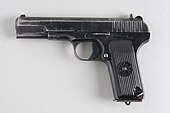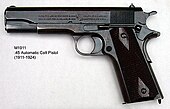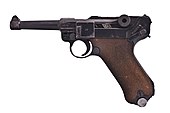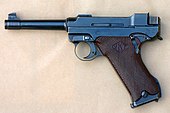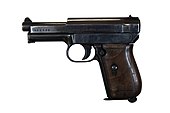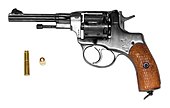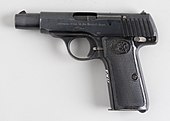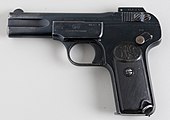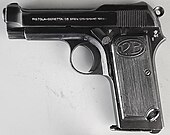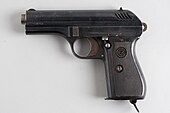List of former equipment of the Finnish Army
Appearance
This is an (incomplete) list of former equipment used by the Finnish Army. For current equipment, see here.
Tanks and other armoured vehicles
[edit]Post-Cold War
[edit]| Model | Origin | Type | Quantity | Image | Details |
|---|---|---|---|---|---|
| Leopard 2R | Combat engineering vehicle | 6[1] | The vehicles were stored due to their unsuitability in Finnish terrain. All were donated to Ukraine in 2023.[2] |
Cold War era tanks
[edit]| Model | Origin | Type | Quantity | Image | Details |
|---|---|---|---|---|---|
| PT-76 PT-A |
Amphibious light tank Driver training tank |
12 units 8 units |

|
In use between 1963 and 1994. Some PT-76s were converted into the PT-A training tanks (for the BTR-50) after they stopped being used as light tanks. | |
| T-72M1 T-72M1K T-72M1K1 |
Main battle tank Command tank Command tank |
157 units 3 units 2 units |

|
In use between 1984 and 2006, 63 T-72M1 and T-72M1K from the Soviet Union in 1984–86, and 97 from ex-East Germany in 1992 (of these 66 were made in Czechoslovakia, and 33 were made in Poland). 162 units total. | |
| T-55, after modernization T-55M T-55K, after modernization T-55MK |
Main battle tank Command tank |
64 units 10 units |

|
In use since 1966, modernized in 1989, total 74 units, 9 still in use 2021. | |
| T-54 | Main battle tank | 43 units | 
|
The variant is the T-54-3, also known as M1951. It was in use between 1959 and 1969 (and removed from storage in 2005), 43 units.[3] | |
| Comet Mk I Model B | Cruiser tank | 41 units | 
|
In use between 1960 and 1971. | |
| Charioteer Mk VII Model B | Medium tank | 38 units | 
|
In use between 1958 and 1980. | |
| MTU-20 | Bridge laying tank | 4 units | 
|
World War II tanks
[edit]| Model | Origin | Type | Quantity | Image | Details |
|---|---|---|---|---|---|
| ISU-152 ISU-152V |
Self-propelled gun Armoured recovery vehicle |
1 unit 1 unit |

|
The standard ISU-152 was captured, operated and abandoned in 1944. Another was captured in 1944 and rebuilt into an armoured recovery vehicle and was used between 1944 and 1959. | |
| Panzerkampfwagen IV Ausf. J | Medium tank | 15 units | 
|
In use between 1944 and 1962. | |
| Sturmgeschütz 40G (Stu-40) Sturmgeschütz III Ausf. G (StuG III) |
Assault gun | 30 units 29 units |

|
In use between 1943 and 1966. In use between 1944 and 1966. | |
| KV-1E m 1941 KV-1 m 1942 |
Heavy tank | 1 unit 1 unit |
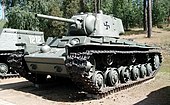
|
In use between 1943 and 1954. In use between 1942 and 1954. | |
| T-50 | Light infantry tank | 1 unit | 
|
Modified in Finland with additional armour. In use between 1942 and 1954. | |
| T-34-76 T-34-85 |
Medium tank | 9 units 9 units |

|
The short-barreled tanks were m 1941, m 1942 and m 1943 models. These were captured vehicles that were in use between 1941 and 1961. The T34-85 were in use between 1944 and 1961. Two units were registered in the inventory, but were never in operational use. | |
| BT-42 | Assault gun | 18 units | 
|
Modified Soviet BT-7 tank. In use between 1943 and 1956. | |
| BT-43 | Armoured personnel carrier | 1 unit | Modified Soviet BT-7 tank. In use between 1944 and 1945. | ||
| BT-2 BT-5 BT-7 |
Cavalry tank | 15 units 62 units 53 units |

|
Several captured in the Winter War and in 1941. The tank was in use only during 1941 and was soon replaced by the T-26 due to its poor reliability. The remaining tanks were either stored, rebuilt, dismantled (turrets being included into permanent casements), or scrapped. | |
| T-28, later modified to T-28E standard T-28E T-28V |
Medium tank Medium tank Armoured recovery vehicle |
6 units 1 unit 1 unit |
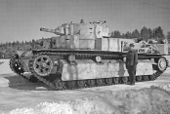
|
Two m 1938 were captured in the Winter War and the remainder in 1941. In use from 1939 to 1950. The T-28V was a modified T-28E and was used from 1945 to 1950. | |
| T-20 m 1937, T-20 m 1938, 1939 |
Artillery tractor | 33 units 184 units |

|
In use from 1939 to 1959. | |
| T-38 and T-38M-2 T-38-34 T-38-KV |
Amphibious light tank | 19 units 11 units 4 units |

|
The -34 and -KV were driver training tanks for the T-34 and KV-series of tanks. In use 1939 to 1945. In use 1944 to 1959. In use 1944 to 1959. | |
| T-37A tank | Amphibious light tank | 29 units | 
|
In use 1939 to 1942. | |
| T-26 m 1931 T-26 m 1933 T-26 m 1937 and T-26 m 1939 OT-26 OT-130 OT-133 T-26E T-26T |
Light tank Light tank Light tank Flamethrower tank Flamethrower tank Flamethrower tank Light tank Artillery tractor |
12 units 63 units 36 units 2 units 4 units 3 units 63 units 6 units |

|
In use 1939 to 1945. In use 1939 to 1959. In use 1939 to 1959. In use 1939 to 1945. In use 1941 to 1942. In use 1942 In use 1939 to 1959. In use 1942 to 1959. |
Pre-war tanks
[edit]| Model | Origin | Type | Quantity | Image | Details |
|---|---|---|---|---|---|
| Vickers 6-Ton | Light tank | 32 units | 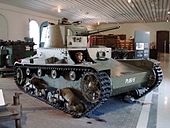
|
In use 1933 to 1959. | |
| Vickers-Carden-Lloyd Model 1933 Vickers-Carden-Lloyd Mk VI |
Tankette | 1 unit 1 unit |

|
Only in use in 1933. | |
| Saint-Charmond modèle 1921 | Light tank | 1 unit | 
|
In use 1923 to 1937. | |
| Renault FT-17 | Light tank | 34 units | 
|
In use 1919 to 1942. |
IFVs and APCs
[edit]| Model | Origin | Type | Quantity | Image | Details | |
|---|---|---|---|---|---|---|
| Infantry fighting vehicles | ||||||
| BMP-1 BMP-1TJ BMP-K1 BMP-PS BMP-1K |
Infantry fighting vehicle Forward observation post vehicle Command vehicle _ Command vehicle |
195 units | 
|
In use between 1982 and 2004. Bought in two batches (85 in 1981 from the Soviet Union and 110 from ex-East German stocks in the beginning of the 1990s). | ||
| Armoured personnel carriers (tracked) | ||||||
| BTR-50 BTR-50PK BTR-50PU after modernization: BTR-50YVI BTR-50YVI-EK BTR-50PUM BTR-50PUM1 BTR-50PUM2 |
Armoured personnel carrier Armoured Personnel Carrier Command vehicle _ Command vehicle HQ vehicle Armoured Personnel Carrier Armoured Personnel Carrier Armoured Personnel Carrier |
118 units 110 units 8 units _ 40 units _ _ _ Few |

|
In use between 1980s–2010s. The YVI came in 5 different versions. | ||
| Armoured personnel carriers (wheeled) | ||||||
| BTR-60 BTR-60PA BTR-60PB BTR-60PUM BTR-60 R-145BM BTR-60PBK |
Armoured personnel carrier | ? 1 unit 83 units Few Few Few |

|
In use between 1980s–2000s. Total 112 units. | ||
| BTR-80 | Armoured personnel carrier | 2 units | 
|
Test vehicles, later converted to command vehicles in BTR-60 units. | ||
| Valmet 1912-6 | Armoured Personnel Carrier | 1 unit | 1 prototype unit (lost competition to Sisu XA-180) | |||
| VK | Armoured Personnel Carrier | 1 unit | 1 prototype unit (lost competition to Sisu XA-180) | |||
Armoured cars
[edit]| Model | Origin | Type | Quantity | Image | Details |
|---|---|---|---|---|---|
| BA-10 BA-10N |
Armoured car | 24 units | 
|
In use between 1939 and 1959. | |
| BA-6 BA-3 |
Armoured car | 10 units 1 unit |
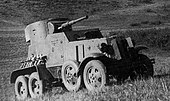
|
In use between 1944 and 1956 In use between 1944 and 1954. | |
| FAI-M BA-20 BA-20M |
Armoured car | 18 units | 
|
In use between 1939 and 1956. | |
| FAI | Armoured car | 3 units | 
|
In use between 1943 and 1950. | |
| D-8 | Armoured car | 1 unit | 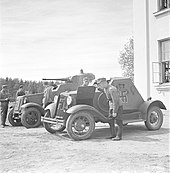
|
In use between 1941 and 1942. | |
| Landsverk 182 | Armoured car | 1 unit | 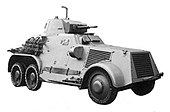
|
In use between 1936 and 1941. | |
| Fiat armored car | Armoured car | 1 unit | 
|
In use between 1918–early 1920s. | |
| Austin Model 1917 | Armoured car | ? units | 
|
In use between 1918–early 1920s. | |
| Peerless | Armoured car | ? units | 
|
Various vehicles
[edit]| Model | Origin | Type | Quantity | Image | Details |
|---|---|---|---|---|---|
| Sisu Nasu | Tracked articulated vehicle | 
|
In use between 1980s–2017. 27 NA-122 self-propelled mortars and 12 NA-123 ammunition supply vehicles are still in use. | ||
| Bandvagn 202 | Tracked articulated vehicle | 15 units | 
|
||
| MAZ-537G | Tank transporter | 6 units[4] | 
|
Pulling the ChMZAP-5247G semi-trailer. | |
| GT-SM | Tracked transport vehicle | 
|
|||
| ATS-59 | Artillery tractor | 28 units | 
|
In use between 1965 and 2002. | |
| AT-S | Artillery tractor | 50 units | 
|
In use between 1960 and 2002. | |
| Raupenschlepper Ost | Artillery tractor | 20 units | 
|
In use between 1943–.[when?] | |
| Sisu KB-45 | Off-road lorry | 83 units | 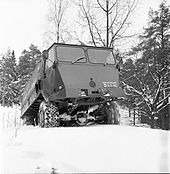
|
In use between 1965 and 2008. | |
| Sisu A-45 | Off-road lorry | About 500 units | 
|
In use between 1970 and 2008. | |
| Vanaja VAKS | Military truck | 155 units | 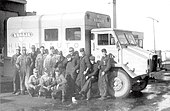
|
In use between 1960–.[when?]
| |
| Vanaja NS-47 | Military truck | 38 units | 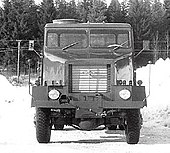
|
In use between 1962–.[when?]
| |
| Sd.Kfz. 9 | Half-track | 2 units | 
|
In use between 1943–. Recovery vehicle, arrived with the purchase of the StuG III assault guns. | |
| Büssing-Nag 4500 A | Lorry | 
|
In use between 1943 and 1945. | ||
| M2 half-track car | Half-track | 213 units | 
|
In use between 1948 and 1964. | |
| McCormick TD-14 | Artillery tractor | 
|
In use between 1940 until the 1950s. | ||
| Ford Thames | Military truck | 115 units | 
|
||
| ZIL-157 | Military truck | 86 units | 
|
In use between 1962 until the 1990s. | |
| KrAZ-255B | Military truck | 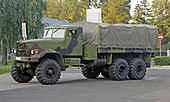
|
In use between 1962 until the 2010s. | ||
| ZIL-131 | Military truck | About 400 units | 
|
In use between 1973 until the 2010s. | |
| UAZ-452 | Off-road van | 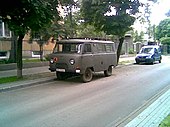
|
In use between 1973 until the 2010s. | ||
| UAZ-469 UAZ-315126 |
Off-road military light utility vehicle | 250+ units | 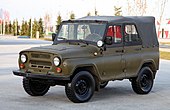
|
In use between 1976 until the 2000s. | |
| GAZ-51 | Military truck | 100 units | 
|
In use between 1962 until 1970s. | |
| GAZ-66 | Off-road lorry | 440 units | 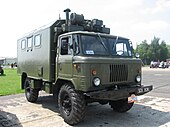
|
In use between 1972 until the 2000s. | |
| GAZ-69 | Off-road military light utility vehicle | 
|
|||
| Unimog D | Military truck | 99 units | 
|
In use between 1955 until ?[when?]. | |
| Unimog G | Military truck | 69 units | 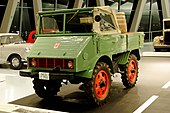
|
In use between 1955 until ?[when?]. | |
| Valmet 702 | Tractor | 
|
|||
| Fabrique Nationale AS 24[5] | Motorized tricycle | 
|
Railroad artillery
[edit]| Model | Origin | Type | Quantity | Image | Details |
|---|---|---|---|---|---|
| 305/52 ORaut | Railway gun | 3 units | 
|
Soviet TM-3-12 railroad guns. In use 1943–1944. | |
| 180/57 NRaut | Railway gun | 4 units | 
|
Soviet TM-1-180 guns. In use 1941–1944. | |
| 152/45 ORaut | Railway gun | 4 units | 
|
In use 1924–1964. | |
| 130/50 ORaut | Railway gun | units | In use 1964–1972. | ||
| Armored train | Armored train | 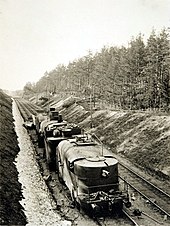
|
In use 1918–. |
Rocket launchers
[edit]| Model | Origin | Type | Quantity | Image | Details |
|---|---|---|---|---|---|
| 122 RAKH 76 | Multiple rocket launcher | 34 units | 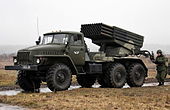
|
BM-21 Grad. In use between 1976–2000s. | |
| 280 RAKH 44 | Multiple rocket launcher | 15 units | 
|
In use between 1944–. | |
| 150 RAKH 44 | Multiple rocket launcher | 15 units | 
|
15 cm Nebelwerfer 41. In use between 1944–. |
Self-propelled artillery
[edit]| Model | Origin | Type | Quantity | Image | Details |
|---|---|---|---|---|---|
| 152 TELAK 91 | Self-propelled artillery | 18 units | 
|
2S5 Giatsint-S. In use between 1991 and 2015. |
Howitzers
[edit]Heavy howitzers (150–210 mm)
[edit]| Model | Origin | Type | Quantity | Image | Details |
|---|---|---|---|---|---|
| 210 H 17 | Heavy howitzer | 4 units | 
|
21 cm Mörser 16. In use between 1939–1960s. | |
| 203 H 17 | Heavy howitzer | 32 units | 
|
8 in Howitzer Mk 7 (Vickers Mk 6). In use between 1940–1960s. | |
| 155 H 17, 12 units later modified to 152 H 15-17 | Howitzer | 151 units | 
|
Canon de 155 C modèle 1917 Schneider. 12 were rebarreled to 152mm in 1944 and thereafter known as 152 H 15-17. In use between 1920s–1980s | |
| 155 H 15 | Howitzer | 24 units | 
|
In use between 1939–1960s | |
| 152 H 88-40 | ( |
Howitzer | 42 units | 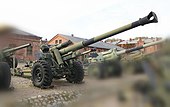
|
A modernized German 15 cm sFH 18 howitzer fitted with a new 152 mm barrel. Original Finnish designation 150 H 40. In use between 1988 and 2007 |
| 152 H 88-37 | ( |
Howitzer | 64 units | A modernized Soviet 152 mm ML-20 howitzer fitted with a new barrel. Original Finnish designation 152 H 37. In use between 1988 and 2007 | |
| 152 H 88-31 | ( |
Howitzer | 21 units | A modernized Soviet 122mm A-19 gun converted to a howitzer by fitting a new 152 mm L/32 barrel. Finnish Army designation for the original A-19 version was 122 K 31. In use between 1988 and 2007 | |
| 152 H 55 | Howitzer | 126 units | 
|
Soviet 152 mm towed D-20 howitzer bought from ex-East German stocks. In use between 1991 and 2017. | |
| 152 H 38 | Howitzer | 102 units | 
|
Four were later modified into the 152 H 38M. In use between 1941–. | |
| 152 H 37-31<<check>> | Howitzer | Modernized 122 K 31 guns. | |||
| 152 H 37 | Howitzer | 66 units | 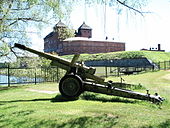
|
Later modernized into the 152 H 37 A and 152 H 88-37A. In use between 1942 and 1988. | |
| 152 H 30 | Howitzer | 1 unit | 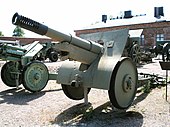
|
Experimental gun, captured in the Continuation War. In use between 1941 and 1944. | |
| 152 H 17 | Howitzer | 8 units | 
|
In use between 1924–. | |
| 152 H 15 | Howitzer | 4 units | 
|
In use between 1924–. | |
| 152 H 09-30 | Howitzer | 109 units | 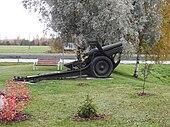
|
In use between 1939–1980s. | |
| 152 H 10 | Howitzer | 9 units | 
|
In use between 1918 and 1966. | |
| 150 H 40 | Howitzer | 48 units | 
|
42 units were later modernized into the 152 H 88-40. In use between 1940 and 1988. | |
| 150 H 15 | Howitzer | 20 units | 
|
In use between 1940 and 1962. | |
| 155 H 15 and 155 H 10-30<<check>> | Howitzer | About 232 units | 
|
In use between 1939–1960s | |
| 150 H 14 J | Howitzer | 12 units | 
|
In use between 1918 and 1939. | |
| 150 H 06 | Howitzer | 12 units | 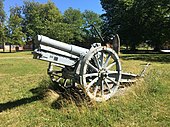
|
In use between 1940 and 1944. |
Medium howitzers (105–122 mm)
[edit]| Model | Origin | Type | Quantity | Image | Details |
|---|---|---|---|---|---|
| 122 H 38 | Howitzer | 41 units[6] | 
|
In use between 1942 and 1975 | |
| 122 H 10-30 | ( |
Howitzer | 247 units[7] | 
|
In use between 1939–. |
| 122 H 10 later modernized to 122 H 10-40 |
( |
Howitzer | 39 units | In use between 1918–. | |
| 122 H 09-30 | ( |
Howitzer | 25 units[8] | 
|
In use between 1939–. |
| 122 H 09 later modernized to 122 H 09-40 |
Howitzer | 31 units[9] | 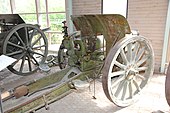
|
In use between 1918–. | |
| 120 H 13 | Howitzer | 13 units | 
|
In use between 1940–. | |
| 120 H 05 | Howitzer | In use between 1918 and 1944. | |||
| 120 MH 01 | Howitzer | 2 units | 
|
In use between 1918–. | |
| 114 H 18 | Howitzer | 54 units | 
|
In use between 1939–. Later used in the BT-42 assault gun. | |
| 105 H 41-18 | Howitzer | 1 unit | 
|
In use between 1941 and the 1960s. | |
| 105 H 41 | Howitzer | 27 units[10] | 
|
In use between 1941 and the 1960s. | |
| 105 H 37 | Howitzer | 134 units | 
|
License manufactured Swedish 10,5 cm fälthaubits L/22, 134 units, all modified into 105 H 37-40 in the 1960s, and into 105 H 61-37 in 1961. 40 were given to Estonia. In use between 1942–1990s. | |
| 105 H 33-40 | Howitzer | 8 units | 
|
In use between 1944–. | |
| 105 H 33 | Howitzer | 53 units | 
|
In use between 1944–. | |
| 105 H 36-09 | Howitzer | ||||
| 105 VH 10 | Mountain howitzer | 4 units | In use between 1940 and 1944. |
Field guns
[edit]Heavy field guns (130–155 mm)
[edit]| Model | Origin | Type | Quantity | Image | Details |
|---|---|---|---|---|---|
| 155 K (93) | Field gun | 1 unit | 
|
In use between 1993– | |
| 155 K (91) | Field gun | 1 unit | In use between 1991– | ||
| 155 K (88) | Field gun | 1 unit | In use between 1988– | ||
| 155 K 74 | Field gun | In use between 1981– | |||
| 155 K 68 | Field gun | 13 units | In use between 1970s–. | ||
| 155 K 17 | Field gun | 12 units | 
|
In use between 1941 and 1944 | |
| 152 KH X 67 | Field gun | 2 units | In use between 1967– | ||
| 130 K 90-60 | Field gun | 15 units | 
|
Modernized 122 K 60. In use between 1990–. | |
| 130 K 54 | Field gun | 322 units | 
|
156 from the Soviet Union 1965–1973, and another 166 in 1993 from Germany after the unification. In use between 1965 and 2019. |
Medium field guns (105–122 mm)
[edit]| Model | Origin | Type | Quantity | Image | Details |
|---|---|---|---|---|---|
| 122 K 60 | Field gun | 15 units | 
|
Later modernized into 130 K 90–60. In use between 1960 and 1990. | |
| 122 K 31 | Field gun | 29 units | 
|
In use between 1941 and the 1970s. | |
| 120 K 78-31 | Field gun | 24 units | 
|
In use between 1940 and the 1960s. | |
| 120 K 78-16 | Field gun | 72 units | 
|
In use between 1940 and the 1960s. | |
| 107 K 13 | Field gun | 2 units | 
|
In use between 1940 and the 1960s. | |
| 107 K 10 | Field gun | 9 units | 
|
In use between 1940 and the 1960s. | |
| 105 KH 36 | Field gun | 1 unit | Equipped with a replacement barrel. In use between 1940 and the 1960s. | ||
| 105 K 34 | Field gun | 12 units | 
|
In use between 1940 and the 1960s. | |
| 105 K 29 | Field gun | 54 units | 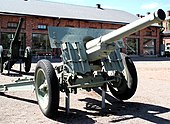
|
In use between 1941–. | |
| 105 K 13 | Field gun | 22 units | 
|
In use between 1940–. | |
| 105 K 10 | Field gun | 4 units | 
|
In use between 1943–. Modified 107 K 10 guns. |
Light field guns (63–84 mm)
[edit]| Model | Origin | Type | Quantity | Image | Details |
|---|---|---|---|---|---|
| 84 K 18 | Field gun | 30 units | 
|
In use between 1940 and 1960 | |
| 77 K 96 | Field gun | 8 units[11] | 
|
In use between 1918 and 1926 | |
| 76 K 42 | Field gun | 12 units | 
|
In use between 1944–. | |
| 76 K 39 | Field gun | 9 units | 
|
In use between 1939–. | |
| 76 VK 38 | Field gun | 9 units[12] | 
|
In use between 1939 and 1951. | |
| 76 K 36 | Field gun | 76 units | 
|
In use between 1939 and 1994. | |
| 76 RekK 35 or 76 K/DRP | Field gun | 2 units | In use between 1939 and 1941 | ||
| 76 RK 27-38 | Field gun | 1 units | 
|
In use between 1941–. | |
| 76 K 27-k | Field gun | 13 units | 
|
In use between 19 and 19 | |
| 76 RK 27 and 76 RK 27-39 | Field gun | 235 units | 
|
In use between 1939–. | |
| 76 K 23 | Field gun | 4 units | In use between 1924 and 1945. | ||
| 76 LK 10-13 | Mountain gun | 72 units[13] | 
|
In use between 1918–. | |
| 76 VK 09 | Mountain gun | 18 units | 
|
In use between 1918 and 1946. | |
| 76 VK 04 | Mountain gun | 11 units | 
|
In use between 19 and 19 | |
| 76 K 02-38 | Field gun | ||||
| 76 K 02 | Field gun | 249 units[14] | 
|
In use between 1918 and 1994. | |
| 76 K 02-30 | Field gun | 93 units | 
|
In use between 1941 and 1994. | |
| 76 K 02-30/40 | Field gun | 14 units[15] | 
|
In use between 1941 and 1994. | |
| 76 K 02-34 | Field gun | 1 unit | 
|
In use between 1934 and 1941. | |
| 76 K 02-38 | Field gun | 2 units | 
|
In use between 1938 and 1942. | |
| 76 K 00 | Field gun | 34 units | 
|
In use between 1918–. | |
| 75 K 40 A, later 76 K 37 | Field gun | 8 units | 
|
In use between 1940–. | |
| 75 K 36 | Field gun | 1 unit | In use between 1939–. | ||
| 75 K 17 | Field gun | 200 units | 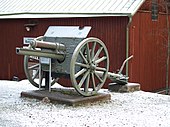
|
In use between 1940–1990s. | |
| 75 VK L14 | Mountain gun | 12 units | In use between 1918 and 1931. | ||
| 75 K 11 | Field gun | 1 unit | 
|
In use between 1929–. | |
| 75 K 02 | Field gun | 36 units | 
|
In use between 1929–. | |
| 75 K 01 | ( |
Field gun | 12 units | 
|
In use between 1940 and 1944. |
| 75 VK 98 | Mountain gun | 44 units | 
|
In use between 1918 and 1937. | |
| 75 K 97 | Field gun | 48 units | 
|
In use between 1940 and 1962. | |
| 63 K 84 | Field gun | 4 units | In use between 1918–. |
Siege artillery
[edit]| Model | Origin | Type | Quantity | Image | Details |
|---|---|---|---|---|---|
| 279 M 77 | Coastal mortar | 5 units | 
|
11-inch siege mortar, model 1877. In use between 1918 and 1951. | |
| 229 M 77 | Coastal mortar | 6 units | 
|
9-inch siege mortar, model 1877. In use between 1919 and 1944. | |
| 155 K 77 | Siege artillery | 48 units | 
|
In use between 1940 and 1944. | |
| 152 K 04-200 p | Siege artillery | 4 units | 
|
In use between 1918 and 1944. | |
| 152 K 77-190 p | Siege artillery | 81 units | 
|
In storage only. In use between 1918–. | |
| 152 K 77-120 p | Siege artillery | 102 units[16] | 
|
In use between 1918 and 1944. | |
| 120 K 78 | Siege artillery | 102 units | 
|
In use between 1940 and 1944. | |
| 107 K 77-piirk | Siege artillery | 57 units[17] | 
|
In use between 1918–1940s. | |
| 107 K 77-ptrik | Field gun | 102 units | 
|
In use between 1918–. | |
| 90 K 77 | Field gun | 100 units | 
|
In use between 1940 and 1944. | |
| 87 K 95 and 87 K 95-R | Field gun | 87 units | 
|
In use between 1918 and 1941. | |
| 87 K 77 | Field gun | 144 units[18] | 
|
In use between 1918–1930s. | |
| 80 K 77 | Field gun | 12 units | 
|
In use between 1940 and 1951. |
Mortars
[edit]Heavy mortars (160–300 mm)
[edit]| Model | Origin | Type | Quantity | Image | Details |
|---|---|---|---|---|---|
| 300 KRH 42 | Mortar | 6 units | 
|
In use between 1942 and 1945. | |
| 160 KRH 58C | Mortar | 60 units | 
|
In use between 1985–. |
Heavy mortars (120 mm)
[edit]| Model | Origin | Type | Quantity | Image | Details |
|---|---|---|---|---|---|
| 120 KRH 85 | Mortar | 60 units | In use between 1985 and 2015. | ||
| 120 KRH 73 | Mortar | In use between 1973–. | |||
| 120 KRH 65 Y 120 KRH 65-73 |
Mortar | 15 units[19] |
The 120 KRH 65-73 was in use from 1974. It was developed into the 120 KRH 85, which is still in use today. | ||
| 120 KRH 62A-H | Mortar | 
|
In use between 1965–. Developed into the Israeli K6, US M120 and M121. | ||
| 120 KRH 40 | Mortar | 377 units | 
|
In use between 1940 until about 2000. Modernized units are known as 120 KRH 40-76 | |
| 120 KRH 38 | Mortar | About 250 units | 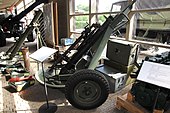
|
In use between 1938 and 2004. Modernized units are known as 120 KRH 38-42, 120 KRH 38-77 and 120 KRH 38-42-77. These have also been retired. |
Medium mortars (81–107 mm)
[edit]| Model | Origin | Type | Quantity | Image | Details |
|---|---|---|---|---|---|
| 107mm M1938 mortar | Mortar | 1 unit | 
|
Several were conquered during WW2 but only one in working condition. Only studied, never in operational use. | |
| 82 KRH 41 | Mortar | 478 units | 
|
In use between 1941–. | |
| 82 KRH 38 | Mortar | ||||
| 82 KRH 37 | Mortar | 
|
In use between 1937–. | ||
| 82 KRH 36 | Mortar | ||||
| 81 KRH 97 | Mortar | 4 units | In test use between 1997–2000s. Also known as 81 COM 97. Currently on display in museums. | ||
| 81 KRH 90 | Mortar | In use between 1990–. | |||
| 81 KRH 71 RT | Mortar | 14 units (81 KRH 71 RT) | There were a coastal fortress variant called 81 KRH 71 RT, which is no longer in service, while infantry variant 81 KRH 71 Y is still in use alongside its modernised counterpart 81 KRH 71 96. The 81 KRH 71 Y mortar is also installed on Bv 206 vehicles. In use between 1971–. | ||
| 81 KRH 64 Y | Mortar | 10 units | In use between 1964 and 1985. | ||
| 81 KRH 56 Y 81 KRH 58P |
Mortar | 20 units | 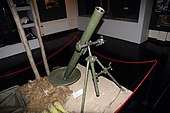
|
First Finnish 81 mm mortar with a circular baseplate. The 58P was a long-barreled version. In use between 1956 and 1985. | |
| 81 KRH 53 | Mortar | ||||
| 81 KRH 42 | Mortar | 24 units | Finnish short-barreled 81 mm mortar model 1942. In use between 1942–. | ||
| 81 KRH 39 | Mortar | 10 units | 
|
10 units and 10,000 shells were given to Finland by the UK in 1940 but due to its different operation and small numbers it was never taken into use. They were sold in the 1960s.[20] | |
| 81 KRH 38 | Mortar | 231 units | 
|
Later modernized and renamed 81 KRH 38 Y. In use between 1938 and 2007. | |
| 81 KRH 36 | Mortar | 9 units (m/30) 6 units (m/36) |
Polish Brandt-type mortar. Later modernized and renamed 81 KRH 36 T 71 Y. In use between 1940 and 2015. | ||
| 81 KRH 36 | Mortar | 227 units | Later modernized and renamed 81 KRH 36 Y. In use between 1936–. | ||
| 81 KRH 36 | Mortar | 109 units | 
|
Later modernized and renamed 81 KRH 36 Y. In use between 1936–. | |
| 81 KRH 35 | Mortar | 68 units | Short-barreled 81 mm mortar model 1935. In use between 1935–. | ||
| 81 KRH 35 | Mortar | 187 units | Long-barreled 81 mm mortar model 1935. In use between 1935 and 2015. It was modified several times, with new base plates, e.g. 81 KRH 35-60 and 81 KRH 35 T 71 | ||
| 81 KRH 34 | Mortar | 25 units[21] | 
|
In use between 1939 and 1986. After WW2 they were altered to fire around the entire plate, and were given a "Y" designation (81 KRH 34Y) | |
| 81 KRH 33 | Mortar | 104 units[22] | 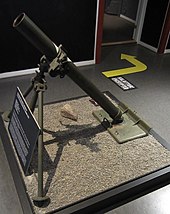
|
In use between 1933 and 1986. | |
| 81 KRH 32 | Mortar | 70 units[23] | 
|
In use between 1932 and 1986. | |
| 81 KRH 31 | Mortar | 100 units | 
|
In use between 1940–. | |
| 81 KRH 30 | Mortar | 16 units | In use between 1930–. | ||
| 81 KRH 26 | Mortar | 90 units | 
|
In use from 1926 until 1936. |
Light mortars (47–60 mm)
[edit]| Model | Origin | Type | Quantity | Image | Details |
|---|---|---|---|---|---|
| 60 KRH 97 | Mortar | 5 units | In test use between 1997–2000s. Also known as 60 COM 97. Currently on display in museums. | ||
| 60 TAM 18 | Mortar | Few units | Some sold for testing to Sweden.[24] | ||
| 60 TAM 15 | Mortar | 4 units | In test use between 1970s–1980s. | ||
| 60 KRH 39 | Mortar | Only a few units[25] | In use between 1939–. | ||
| 50 KRH ss-I 50 KRH ss-IV |
Mortar | 50 units 30 units |

|
||
| 50 KRH 40 50 KRH 39 50 KRH 38 |
Mortar | 1,268 units | 
|
In use between 1939 and 1959. | |
| 47 KRH 41 | Mortar | 50 units | In use between 1941 and 1948. | ||
| 47 KRH 40 | Mortar | Only a few units | In use between 1940–. | ||
| 47 KRH 39 | Mortar | 6 units | In use between 1939 and 1960. |
Siege mortars
[edit]| Model | Origin | Type | Quantity | Image | Details |
|---|---|---|---|---|---|
| 25 cm schwerer Minenwerfer | Trench mortar | 2 units | 
|
Sold in 1937 | |
| 170 MH 12 | Trench mortar | 6 units | 
|
In use between 1918 and 1937. | |
| 91 MH 16 | Trench mortar | 26 units | 
|
In use between 1918 and 1937. | |
| 76 MH 16 | Trench mortar | 26 units | 
|
In use between 1918 and 1937. |
Infantry weapons
[edit]Light machine guns
[edit]| Model | Origin | Type | Quantity | Image | Details |
|---|---|---|---|---|---|
| 7.62 PK 26 | Light machine gun | 6,200 units |  |
||
| 7.62 PK D | Light machine gun | 9,000 units |  |
||
| 7.62 PK D PSV | Light machine gun | 650+ units |  |
||
| 7.62 PK Lewis 7.70 PK Lewis |
Light machine gun | 60 units |  |
||
| 8.00 PK 15 | Light machine gun | 5,000 units |  |
||
| Hotchkiss M1909 Benét–Mercié machine gun | Light machine gun | ||||
| Kulsprutegevär m/40 | Automatic rifle | Units |  |
||
| ZB vz. 26 | Light machine gun | Units |  |
||
| 7.62 KK 54 RPD | Light machine gun | 1,000 units[26] |  |
||
| 7.62 PK 20 | Light machine gun | 729 units |  |
||
| FM 24/29 light machine gun | Light machine gun | 100 units |  |
||
| 7.92 PK FN (FN Mle 30) | Automatic rifle | 700 units | 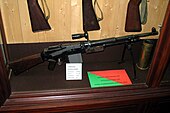
| ||
| 7.92 PK FN (Kg m/21) | Automatic rifle | units |
Machine guns
[edit]| Model | Origin | Type | Quantity | Image | Details |
|---|---|---|---|---|---|
| Hotchkiss M1914 machine gun | Machine gun | 34 units |  |
Used initially with Renault FT tanks, later replaced and used by infantry. | |
| DS-39 | Machine gun | 200 units |  |
||
| Sampo L-41 | Machine gun | 35 units |  |
Only used for testing 1940–1942. | |
| MG 42 | Machine gun | 6 units |  |
Plans were made to build 4,000 units but machining complications and the end of the war put and end to this. | |
| MG 34 | Machine gun | 59 units | |||
| MG 08 | Machine gun | 1,098 units |  |
||
| MG 08/15 | Machine gun | 470 units[27] |  |
||
| MG 08/18 | |||||
| Schwarzlose machine gun | Machine gun | 70 units |  |
||
| Vickers machine gun | Machine gun | 100 units |  |
||
| Maxim M/09-21 | Machine gun | About 4,000 units |  |
Many were obtained as war booty during WW2. In use from 1918 until the 1960s, mothballed until the 1990s. | |
| Maxim M/32-33 | Machine gun | 1,200 units |  |
||
| M1895 Colt–Browning machine gun | Machine gun | 100 units | 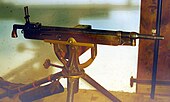 |
Saw usage during Finnish Civil War, retired in 1936. |
Squad support weapon
[edit]| Model | Origin | Type | Quantity | Image | Details |
|---|---|---|---|---|---|
| 30 KRKK AGS-17 | Automatic grenade launcher | 140 units[28] |  |
1990s–2005 |
Assault rifles
[edit]| Model | Origin | Type | Quantity | Image | Details |
|---|---|---|---|---|---|
| 7.62 RK 54 TP 7.62 RK 54 |
Assault rifle | 26.000 units[29] |  |
||
| 7.62 RK 72 | Assault rifle | Units |  |
Submachine guns
[edit]| Model | Origin | Type | Quantity | Image | Details |
|---|---|---|---|---|---|
| Neuhausen MKMS | Submachine gun | 282 units |  |
||
| SIG Bergmann 1920 | Submachine gun | 1,523 units | In use since 1922. | ||
| MP 28 | Submachine gun | 171 units | 
|
Acquired from Belgium in the spring of 1940. Issued to rear echelon troops during the Continuation War[30] | |
| MP 38 | Submachine gun | 160 Units |  |
Delivered alongside German vehicles[30] | |
| MP 40 | 
| ||||
| Suomi KP/31 | Submachine gun | 80,000 units |  |
||
| PPD-34 | Submachine gun | 
|
Captured from Soviet troops; issued to some units in the Continuation War[30] | ||
| PPD-34/38 | 
| ||||
| PPD-40 | Submachine gun | 150 units |  |
||
| PPSh-41 | Submachine gun | 2,500 units |  |
||
| PPS-42 PPS-43 |
Submachine gun | A few hundred units |  |
||
| KP m/44 submachine gun | Submachine gun | 10,000 units |  |
||
| 9.00 kp Sten II 9.00 kp Sten III |
Submachine gun | 76,115 units |
Service rifles
[edit]Handguns
[edit]Anti-aircraft weapons
[edit]Surface-to-air missiles
[edit]| Model | Origin | Type | Quantity | Image | Details |
|---|---|---|---|---|---|
| ITO 86 M | Man-portable infrared homing surface-to-air missile | Some 80-100 launchers, 912 missiles. | 
|
Soviet SA-18 Grouse (9K38 Igla) man-portable SAM missiles, in use between 1994 and 2005. | |
| ITO 86 | Man-portable infrared homing surface-to-air missile | Some 160 launchers, 1558 missiles. | 
|
Soviet SA-16 Gimlet (9K310 Igla-1) man-portable SAM missiles, in use between 1986 and 2005. | |
| ITO 78 | Man-portable infrared homing surface-to-air missile | Some 122 launchers, 1091 missiles. | 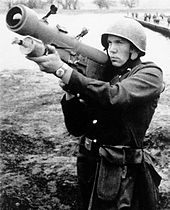
|
Soviet SA-7b Grail (9K32 Strela-2) man-portable SAM missiles, in use between 1978 until 2000. | |
| ITO 96 | Surface-to-air missile system | 3 batteries totalling: 9 TELAR (9A310M1) 9 TEL reload vehicles (9M38M1) 3 target acquisition radars (TAR) (9S18M1) 3 command vehicles (9S470) 115 missiles (9M38M1) |
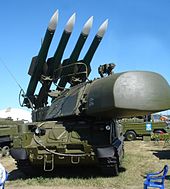
|
Soviet SA-11 Gadfly (9K37 BUK-M1) | |
| ITO 79 | Surface-to-air missile system | 3 batteries, 400 missiles | 
|
Soviet SA-3 Goa (S-125 Pechora) | |
| Thunderbird | Surface-to-air missile system | 1 missile | 
|
British surface-to-air missile obtained for familiarization and training purposes. |
Self-propelled anti-aircraft guns
[edit]| Model | Origin | Type | Quantity | Image | Details |
|---|---|---|---|---|---|
| ITPSV 90 | Self-propelled anti-aircraft weapon | 6 units | 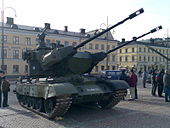
|
In use between 1990 and 2015. British Marksman turret using two Oerlikon 35 mm autocannons mounted on a Polish T-55AM chassis. The turrets were moved to Leopard 2 chassis.[33] | |
| 57 ITPSV SU 57-2 | Self-propelled anti-aircraft weapon | 12 units 9 units |

|
In use 1961–2006. 9 additional units were obtained from Hungary in the 1990s for upgrade purposes of the old wagons, but the entire programme was scrapped in 1999, when it was decided to end the modernization programmes of old Soviet equipment.[34] The Hungarian vehicles were modernized to the T-55A standard in and were given registration numbers starting with Ps 462, while the older Soviet ones had numbers starting with Ps 461. | |
| Landsverk Anti II | Self-propelled anti-aircraft gun | 6 units | 
|
In use between 1942 and 1959. |
Heavy anti-aircraft artillery
[edit]| Model | Origin | Type | Quantity | Image | Details | |
|---|---|---|---|---|---|---|
| 88 ITK 37 | Anti-aircraft gun | 90 units | 
|
German 88mm Flak gun. In use 1943–1980. | ||
| 76 ITK 34 | Anti-aircraft gun | 12 units | 
|
In use from 1936 | ||
| 76 ITK 27 BK 76 ITK 28 B 76 ITK 29 B |
Anti-aircraft gun | 8 units 4 units 4 units |
 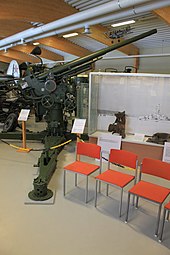 
|
In use from 1928. The M27 was mounted on a fixed mount. | ||
| 76 ITK 16 | Anti-aircraft gun | 24 units | 
|
In use from 1934. Breda 76 mm anti-aircraft gun. | ||
| 76 ITK 02-34 | Anti-aircraft gun | 8 units | 
|
In use from the 1930s. Russian Obuhov anti-aircraft guns. | ||
| 76 ITK 14 | Anti-aircraft gun | 2 units | 
|
In use from 1918. | ||
| 75 ITK 30 | Anti-aircraft gun | 9 units | 
|
Swedish 75mm Bofors anti-aircraft gun originally manufactured for Siam. | ||
| 75 ITK 37 | Anti-aircraft gun | 20 units | 
|
In use from 1940. |
Medium anti-aircraft artillery
[edit]| Model | Origin | Type | Quantity | Image | Details |
|---|---|---|---|---|---|
| 57 ITK 60 | Anti-aircraft gun | 24 units[35] | 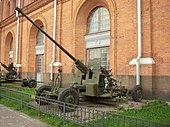
|
Soviet S-60 57 mm anti-aircraft gun. Nicknamed Nikolai. In use from 1960 until 2000. | |
| 40 ITK 38 | Anti-aircraft gun | 288 units | 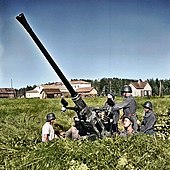
|
Swedish 40 mm Bofors anti-aircraft gun. In use since 1938 until the 1980s. | |
| 40 ITK 15 | Anti-aircraft gun | 9 units | 
|
40 mm Pom-Pom gun | |
| 37/30 Ma | Anti-aircraft gun | 16 units | 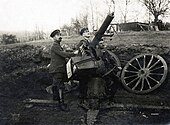
|
37 mm Pom-Pom gun, in use 1918–1944. | |
| 37 ITK 37 | Anti-aircraft gun | 4 units | 
|
In use 1944–1959. | |
| 37 ITK 39 | Anti-aircraft gun | 1 unit | 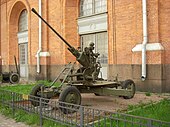
|
Several Soviet 61-K 37 mm anti-aircraft gun were captured but only little ammunition, so only one gun was operational for a short time. In use in 1941. | |
| 35 ITK 58 | Anti-aircraft gun | 16 units | 
|
Later modernized to 35 ITK 88 standard | |
| 30 ITK 62 30 ITK 61 HS |
Anti-aircraft gun | 27 units 3 units |
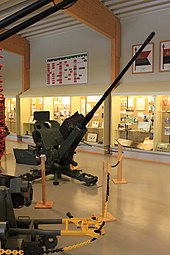
|
Swiss Hispano-Suiza 30 mm anti-aircraft gun bought in 1962. |
Anti-aircraft cannons and machine guns
[edit]| Model | Origin | Type | Quantity | Image | Details |
|---|---|---|---|---|---|
| 20 ITK HS | Anti-aircraft gun | 2 units | 
|
Swiss Hispano-Suiza 20 mm anti-aircraft gun bought in 1963 and used until 1972 for testing purposes. The name used during the testing was "20 ItK/HS/HS 669/HS 820 L 85". | |
| 20 ITK OE | Anti-aircraft gun | 2 units | 
|
Swiss Oerlikon 20 mm anti-aircraft gun bought in 1963 and used until 1975 for testing purposes. The name used during the testing was "20 ItK/Oe/10 ILa/5 TG". | |
| 20 TorKK MG-151 | Anti-aircraft gun | 
|
|||
| 20 ITKIV L-39/44 | Anti-aircraft gun | 325 units | 
|
In use 1944–1950s. Fully-automatic version of the Lahti L-39 anti-tank rifle. | |
| 20 ITK 30 M 20 ITK 36 M 20 ITK 36 M2 20 ITK 39 M 20 ITK 40 M 20 ITK 42 M 20 ITK 43 M |
Anti-aircraft gun | 6 units 32 units 1 units 56 units 146 units 50 units 71 units |

|
In total there were 362 cannons in use from 1930 until 1980s. | |
| 20 ITK 40 VKT | Anti-aircraft gun | 180 units | 
|
In use from 1943 until the 1980s. | |
| 20 ITK 35 | Anti-aircraft gun | 88 units | 
|
Italian Breda Model 35, in use from 1939. | |
| 20 ITK 30 BSW 20 ITK 38 BSW |
Anti-aircraft gun | 50 units 113 units |

|
In use from 1939 until the 1960s. In storage until the 1990s. | |
| 20 ITK 23 | Anti-aircraft gun | 4 units | In use from 1924. | ||
| 8.00 ITKK 36 | Anti-aircraft machinegun | 4 units | 
|
||
| 7.62 ITKK 09-09 | Anti-aircraft machinegun | 
|
In use from 1925 until 1986. | ||
| 7.62 ITKK 09-21 | Anti-aircraft machinegun | 
|
In use from 1925 until 1986. | ||
| 7.62 ITKK 32-33 | Anti-aircraft machinegun | 
|
In use from 1925 until 1986. | ||
| 7.62 ITKK 09-31 | Anti-aircraft machinegun | 80+ units | 
|
Soviet quadruple 7.62 mm Maxim machinegun M1931 | |
| 7.62 ITPK DA-2 | Anti-aircraft machinegun | 
|
Aircraft variant of the Soviet Degtyaryov machine gun. Many were taken into use as AA-rifles. | ||
| 7.62 ITKK 31 VKT 7.62 ITKK 31-40 VKT |
Anti-aircraft machinegun | 135 units 475 units |

|
||
| 7.62 ITKK L33/39 | Anti-aircraft machinegun | 130 units | 
|
Mainly used on small craft in the Finnish Navy |
Radars
[edit]| Model | Origin | Type | Quantity | Image | Details |
|---|---|---|---|---|---|
| Radioluotain (RL) m/40 Raija GEMA FuMG 40 G Freya LZ-Stand (Freya radar) |
Early warning radar | 4 units | 
|
Two in use from 30 March 1943, and two more 20–23 June 1944. Range approx. 100 km. | |
| Radioluotain (RL) m/39 Würzburg T Irja Telefunken FuSE 62 Würzburg T/D ("Dora") |
Gun laying radar | 8 units | 
|
Mobile radar units. Range: 20–30 km. In operation 1943–1950s. | |
| Radioluotain (RL) m/4? Riitta Telefunken FuSE 65 Würzburg-Riese |
Gun laying and tracking radar | 4 units | 
|
In use 1944-03-10 | |
| Liisa FuG 202 Lichtenstein |
Airborne radar | 8 units | 
|
Arrived on 1944-03-10 but were not taken into use during the war. | |
| m/45 Maija FuMO 1 Seetakt |
Maritime surveillance radar | 4 units | 
|
3 arrived in December 1943, and 1 in January 1944. | |
| Vesa Seeburg-Tisch |
Mechanical Plotting table | ||||
| AN/TPS-1E | Early warning radar | 
|
Bought as a gap-filler in 1954. Used until ca. 1988. | ||
| VRTTI VII | Early warning radar | 6 units | In use between 1954–1970s. | ||
| Decca radar | Counter-battery radar | In use from 1951 to ?. | |||
| Severi | Counter-battery radar | 
|
In use from 1955 to 1976. Some were modified to airport radars, and were called Faarao. | ||
| Cymbeline FA 15 MKL | Mortar locating radar | 
|
In use from 1976 to ca. 2000 |
Anti-tank weapons
[edit]Guided anti-tank weapons
[edit]| Model | Origin | Type | Quantity | Image | Details |
|---|---|---|---|---|---|
| PstOhj 83 PstOhj 83M |
Anti-tank guided missile | 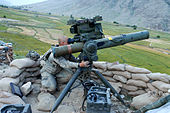
|
BGM-71C I-TOW BGM-71 TOW 2 | ||
| PstOhj 82 | Anti-tank guided missile | 
|
AT-4 Spigot | ||
| PstOhj 82M | Anti-tank guided missile | 
|
AT-5 Spandrel. | ||
| RO-63 | Anti-ship missile | 200 missiles, (100 training, 52 anti-tank, 48 anti-ship), ? launchers.[36] | 
|
French SS.11 anti-tank missiles used in coastal defense, obtained in 1963. In operation from 1964 until 1995. | |
| Vickers Vigilant | Anti-tank guided missile | 250 missiles (of whom 100 for training), 10 launchers.[37] | The army's first missile. In operation between 1962–. |
Unguided anti-tank rockets
[edit]| Model | Origin | Type | Quantity | Image | Details |
|---|---|---|---|---|---|
| 66 KES 75 66 KES 88 |
Anti-tank rocket-propelled grenade launcher | 77,000+ units | 
|
M72A2 LAW. In operation from 1975 until 2014. M72A5 LAW. In operation from 1988 until 2020. | |
| Sarpac | Anti-tank rocket-propelled grenade launcher | French Sarpac disposable anti-tank recoilless rifle. | |||
| 74 KES 68 | Anti-tank rocket-propelled grenade launcher | 
|
Swedish Miniman disposable anti-tank recoilless rifle. | ||
| 55 S 55 | Anti-tank rocket-propelled grenade launcher | 10,000+ units | 
|
In operation between 1955–1990s. Kept in storage until 2005. | |
| 100 pshp/F1 142 pshp/F2 |
Anti-tank rocket-propelled grenade launcher | 25,812 units[38] | 
|
Panzerfaust. In operation from 1944 to 1959.[39] | |
| 88 rakh/B 54 | Anti-tank rocket-propelled grenade launcher | 1,854 units | 
|
Panzerschreck, in use from 1944 until 1959.[40] |
Anti-tank guns and rifles
[edit]| Model | Origin | Type | Quantity | Image | Details |
|---|---|---|---|---|---|
| 8 PSTKIV | Anti-tank rifle | 30 units | 
|
Polish Wz. 35 anti-tank rifle | |
| 14 PSTKIV 37 | Anti-tank rifle | 300 units | 
|
British Boys anti-tank rifle | |
| 14.5 PSTKIV 41 Simonov | Anti-tank rifle | 
|
Soviet PTRS-41 anti-tank rifle | ||
| Madsen 20 mm cannon | Anti-tank rifle | 12 units[41] | 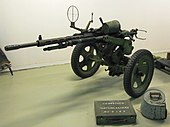
|
||
| 20 L 39 20 L 39-44 |
Anti-tank rifle | 2,078 units | 
|
Finnish Lahti L-39 anti-tank rifle, "elephant gun". | |
| 25 PSTK 34 25 K 37 |
Anti-tank rifle | 133 units 104 units[42] |

|
French 25 mm Hotchkiss, called Marianne. In use since 1940. Withdrawn from service in 1943. Sold in 1959.[43] | |
| 28 K 41 | Anti-tank rifle | 2 units | 
|
In use in 1944. Sold in 1959.[44] | |
| 37 K 14 37 K 15 |
Trench gun | 40 units[45] | 
|
Russian trench gun | |
| 37 PSTK 34 37 PSTK 36 |
Anti-tank gun | 42 units 114 units 355 units |

|
The Swedish Bofors 37mm anti-tank gun were procured both from Sweden, Finland and Poland. It was in use between 1938 until 1944. Sold in 1986.[46] | |
| 37 PSTK 40 37 PSTK 37 |
Anti-tank gun | 178 units[47] | 
|
The German PaK 36 was in use from 1940 until 1944. Sold in 1979.[48] | |
| 45 PSTK 32 45 PSTK 32-38: |
Anti-tank gun | 25 units ? |

|
The Soviet 45 mm anti-tank gun 19-K, in use 1939–1944. Sold in 1993.[49] | |
| 45 PSTK 37 45 PSTK 38 45 PSTK 38-41 |
Anti-tank gun | 
|
The Soviet 45 mm anti-tank gun 53-K, in use 1939–1944. Sold in 1993.[50] | ||
| 45 K 42 | Anti-tank gun | 2 units | 
|
The Soviet 45 mm anti-tank gun M-42, in use 1939–1944. Sold in 1993.[51] | |
| 47 PSTK 35 47 PSTK 39 |
Anti-tank gun | 22 units | 
|
Italian Cannone de 47/32. In use 1940–1942. Sold in 1959.[52] | |
| 47 PSTK 40 | Anti-tank gun | 12 units | 
|
French 47mm APX anti-tank gun. In use 1940–1942. Sold in 1959.[53] | |
| 50 PSTK 38 | Anti-tank gun | 27 units | 
|
German 5 cm PaK 38 anti-tank gun. In operation from 1942 to 1944, sold in 1986.[54] | |
| 75 PSTK 40 | Anti-tank gun | 210 units | 
|
German 7.5 cm PaK 40 anti-tank gun. In operation from 1943 to 1986.[55] | |
| 75 PSTK 97-38 | Anti-tank gun | 46 units | 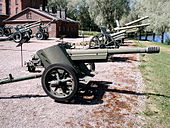
|
Bought in 1940 and upgraded in 1943 to 7.5 cm PaK 97/38 standard. In service until 1986.[56] | |
| 75 K 44 | Anti-tank gun | 1 unit | Finnish prototype gun. | ||
| 76 RK 27 | Infantry support gun | 
|
Soviet 76mm regimental gun M1937, used as an anti-tank gun by the Finns. |
Anti-ship missiles
[edit]| Model | Origin | Type | Quantity | Image | Details |
|---|---|---|---|---|---|
| Meritorjuntaohjus 66 | Anti-ship missile | 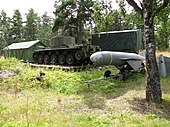
|
Soviet P-15 Termit, used as an anti-ship missile by the Finns. It could be fired both from a separate gun carriage, but it was also transported on a rebuilt Comet tank. | ||
| Meritorjuntaohjus 85 | Anti-ship missile | Four batteries, 3 in the gulf of Finland and 1 in the Archipelago Sea.[57] | 
|
The first version RBS-15SF (known in Finland as MTO-85 (Meritorjuntaohjus 1985)) was a variant of the Swedish RSB-15 Mk.II. It was taken into use between 1987–1991. It was later modified into RBS-15SF-3 (a modernized Mk.II, known in Finland as MTO-85M). It was replaced by the Pintatorjuntaohjus 2020 system. |
References
[edit]- ^ "Annual Exchange of Military Information (AEMI) 2023" (PDF) (in Finnish). Finnish Defence Forces. 1 January 2023. Archived (PDF) from the original on 4 January 2023. Retrieved 4 January 2023.
- ^ "Finland donates defence materiel assistance to Ukraine including more of mine-clearing Leopard 2 tanks". Ministry of Defence. 2023-03-23. Retrieved 2023-03-23.
- ^ "Archived copy" (PDF). Archived from the original (PDF) on 2011-07-20. Retrieved 2009-08-02.
{{cite web}}: CS1 maint: archived copy as title (link) - ^ Panssarihistoriaseminaari 2009
- ^ [1]
- ^ Suomen armeijan venäläinen perintö: Tsaarin upseerit ja itänaapurin kalusto Suomen puolustusvoimissa 1918-1948
- ^ Suomen armeijan venäläinen perintö: Tsaarin upseerit ja itänaapurin kalusto Suomen puolustusvoimissa 1918-1948
- ^ Suomen armeijan venäläinen perintö: Tsaarin upseerit ja itänaapurin kalusto Suomen puolustusvoimissa 1918-1948
- ^ Suomen armeijan venäläinen perintö: Tsaarin upseerit ja itänaapurin kalusto Suomen puolustusvoimissa 1918-1948
- ^ Suomen armeijan venäläinen perintö: Tsaarin upseerit ja itänaapurin kalusto Suomen puolustusvoimissa 1918-1948
- ^ [Viacheslav Nikitin; Mirko Harjula: Suomen armeijan venäläinen perintö: Tsaarin upseerit ja itänaapuring kalusto suomen puolustusvoimassa 1918-1948]
- ^ [Viacheslav Nikitin; Mirko Harjula: Suomen armeijan venäläinen perintö: Tsaarin upseerit ja itänaapuring kalusto suomen puolustusvoimassa 1918-1948]
- ^ [Viacheslav Nikitin; Mirko Harjula: Suomen armeijan venäläinen perintö: Tsaarin upseerit ja itänaapuring kalusto suomen puolustusvoimassa 1918-1948]
- ^ [Viacheslav Nikitin; Mirko Harjula: Suomen armeijan venäläinen perintö: Tsaarin upseerit ja itänaapuring kalusto suomen puolustusvoimassa 1918-1948]
- ^ [Viacheslav Nikitin; Mirko Harjula: Suomen armeijan venäläinen perintö: Tsaarin upseerit ja itänaapuring kalusto suomen puolustusvoimassa 1918-1948]
- ^ [Viacheslav Nikitin; Mirko Harjula: Suomen armeijan venäläinen perintö: Tsaarin upseerit ja itänaapuring kalusto suomen puolustusvoimassa 1918-1948]
- ^ [Viacheslav Nikitin; Mirko Harjula: Suomen armeijan venäläinen perintö: Tsaarin upseerit ja itänaapuring kalusto suomen puolustusvoimassa 1918-1948]
- ^ [Viacheslav Nikitin; Mirko Harjula: Suomen armeijan venäläinen perintö: Tsaarin upseerit ja itänaapuring kalusto suomen puolustusvoimassa 1918-1948]
- ^ [Mikko Bäckström: Kranaatinheittimistön kehittämistyö Suomessa toisen maailmansodan jälkeen, p.47]
- ^ [Markku Palokangas: Jalkaväen raskaat aseet ja ryhmäaseet, p.142]
- ^ [Markku Palokangas: Jalkaväen raskaat aseet ja ryhmäaseet, p.178]
- ^ [Markku Palokangas: Jalkaväen raskaat aseet ja ryhmäaseet p.176]
- ^ [Markku Palokangas: Jalkaväen raskaat aseet ja ryhmäaseet, p.174]
- ^ [Mikko Bäckström: Kranaatinheittimistön kehittämistyö Suomessa toisen maailmansodan jälkeen, p.40]
- ^ "Finnish Army 1918 - 1945: 47 Mm - 60 Mm Mortars".
- ^ Majuri, Pekka: Vaikk' on synkeä yö, tykki leimua lyö, p.45
- ^ "FINNISH ARMY 1918 - 1945: MACHINEGUNS PART 2". www.jaegerplatoon.net. Retrieved 2023-11-27.
- ^ Markku Palokangas: Jalkaväen raskaat aseet ja ryhmäaseet, p.23
- ^ Majuri, Pekka: Vaikk' on synkeä yö, tykki leimua lyö, p.45
- ^ a b c "FINNISH ARMY 1918 - 1945: MACHINEPISTOLS PART 2". www.jaegerplatoon.net. Retrieved 2023-11-22.
- ^ a b c "FINNISH ARMY 1918 - 1945: REVOLVERS & PISTOLS PART 4". www.jaegerplatoon.net. Retrieved 2023-11-24.
- ^ "FINNISH ARMY 1918-1945: REVOLVERS & PISTOLS PART 3". 2023-04-04. Archived from the original on 2023-04-04. Retrieved 2023-12-02.
- ^ "MAAVOIMIEN LIIKKUVUUDEN JA TULIVOIMAN ROLL OUT PANSSARIPRIKAATISSA 5.8.2015 – Esiteltävä kalusto" (PDF) (in Finnish). Finnish Defence Forces. 5 August 2015. Archived from the original (PDF) on 5 October 2015. Retrieved 4 May 2016.
- ^ Panssariseminaari 2009
- ^ "Suomen ja Venäjän väliset salaiset aseostosopimukset vuosina 1991–96". 15 July 2021.
- ^ [Puolustusvoimat 100 vuotta, p. 296]
- ^ [Puolustusvoimat 100 vuotta, p. 296]
- ^ Markku Palokangas: Jalkaväen raskaat aseet ja ryhmäaseet, p.104
- ^ Markku Palokangas: Jalkaväen raskaat aseet ja ryhmäaseet, p.37
- ^ Markku Palokangas: Jalkaväen raskaat aseet ja ryhmäaseet, p.37
- ^ Markku Palokangas: Jalkaväen raskaat aseet ja ryhmäaseet, p.42
- ^ Markku Palokangas: Jalkaväen raskaat aseet ja ryhmäaseet, p.46
- ^ Markku Palokangas: Jalkaväen raskaat aseet ja ryhmäaseet, p.39
- ^ Markku Palokangas: Jalkaväen raskaat aseet ja ryhmäaseet, p.45
- ^ Markku Palokangas: Jalkaväen raskaat aseet ja ryhmäaseet, p.49–52
- ^ Markku Palokangas: Jalkaväen raskaat aseet ja ryhmäaseet, p.39
- ^ Markku Palokangas: Jalkaväen raskaat aseet ja ryhmäaseet, p.35
- ^ Markku Palokangas: Jalkaväen raskaat aseet ja ryhmäaseet, p.39
- ^ Markku Palokangas: Jalkaväen raskaat aseet ja ryhmäaseet, p.39
- ^ Markku Palokangas: Jalkaväen raskaat aseet ja ryhmäaseet, p.39
- ^ Markku Palokangas: Jalkaväen raskaat aseet ja ryhmäaseet, p.39, 67
- ^ Markku Palokangas: Jalkaväen raskaat aseet ja ryhmäaseet, p.39
- ^ Markku Palokangas: Jalkaväen raskaat aseet ja ryhmäaseet, p.39
- ^ Markku Palokangas: Jalkaväen raskaat aseet ja ryhmäaseet, p.39
- ^ Markku Palokangas: Jalkaväen raskaat aseet ja ryhmäaseet, p.39
- ^ Markku Palokangas: Jalkaväen raskaat aseet ja ryhmäaseet, p.39
- ^ https://rannikkotykistomuseo.fi/aikajana/meritorjuntaohjus-85/
Sources
[edit]- Käkelä, Erkki (2000). Marskin Panssarituhoojat (in Finnish). Porvoo: WSOY. p. 576. ISBN 951-0-24638-7.
- Lappi, Ahti (2009). Ilmatorjuntaohjukset Suomen puolustuksessa (in Finnish). p. 416. ISBN 978-951-95594-5-2.
- Muikku, Esa (1998). Suomalaiset Panssarivaunut 1918-1997 (in Finnish and English). Tampere: Apali Oy. p. 208. ISBN 952-5026-09-4.
- Palokangas, Markku (1991): Sotilaskäsiaseet Suomessa 1918-1988. Vammalan Kirjapaino Oy. ISBN 951-25-0519-3
- Paulaharju, Jyri (1996). Itsenäisen Suomen kenttätykit 1918-1995. Sotamuseon julkaisuja 1/1996 (in Finnish). Jyväskylä: Sotamuseo. ISBN 978-951-25-0811-2.
- Syrjö, Veli-Matti; Karjalainen, Mikko; Elfvengren, Eero, eds. (2006). Suomen Puolustusvoimat 1944-1974 (in Finnish). W. Söderström. p. 685. ISBN 978-951-0-32493-6.
- Vehviläinen, Raimo; Lappi, Ahti; Palokangas, Markku (2005). Itsenäisen Suomen ilmatorjuntatykit 1917-2000 (in Finnish). Helsinki: Sotamuseo. p. 260. ISBN 978-951-25-1618-6.
- Nikitin, Viacheslav; Harjula, Mirko (2017). Suomen armeijan venäläinen perintö: Tsaarin upseerit ja itänaapurin kalusto Suomen puolustusvoimissa 1918-1948 (in Finnish). Minerva Kustannus. p. 309. ISBN 978-952-312-706-7.










